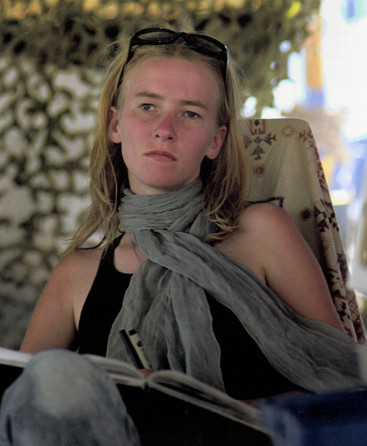March 16th, 2016 marks 13 years since a young American peace activist stood in front of an Israeli armored bulldozer to try to protect a Palestinian home from demolition, and was crushed to death by the driver of the bulldozer.After Rachel Corrie was killed, her parents, Cindy and Craig Corrie, demanded an investigation of her death and justice for those responsible. Thirteen years later, a full, credible investigation has yet to be carried out, according to the late activist’s family.
On the anniversary of her death, the Rachel Corrie Foundation held an event in her hometown of Olympia, Washington, titled “Remember Rachel – Remember Gaza”. The event featured a talk by a friend of Rachel’s, who was volunteering in the International Solidarity Movement with Rachel in 2003 when she was killed.
Rachel was crushed to death March 16, 2003, by an Israeli military, US-funded, Caterpillar D9R bulldozer in Rafah, Gaza, while nonviolently protesting the impending demolition of the home of a Palestinian family. This was one of thousands of homes eventually destroyed in Gaza in clearing demolitions, described in the 2004 Human Rights Watch Report, Razing Rafah.
The U.S. Department of State reported that on March 17, 2003, Israeli Prime Minister Ariel Sharon promised President Bush that the Israeli Government would undertake a “thorough, credible, and transparent” investigation into Rachel’s killing and report the results to the United States. On March 19, 2003, in a U.S. Department of State press briefing, Richard Boucher said in reference to Rachel, “When we have the death of an American citizen, we want to see it fully investigated. That is one of our key responsibilities overseas, is to look after the welfare of American citizens and to find out what happened in situations like these.”
Through tenures of both the Bush and Obama administrations, high level Department of State officials have continued to call for Israeli investigation in Rachel’s case. The family reported that in the years since Rachel was killed, they have met with Lawrence B. Wilkerson (Chief of Staff to Secretary of State Colin Powell), William Burns (then Under Secretary of State) and Antony Blinken (then Deputy Assistant to the President and National Security Advisor to Vice President Biden) – all whom acknowledged lack of an adequate response from the Israeli Government in Rachel’s case.
The family of Rachel Corrie filed multiple lawsuits, including one against the Israeli military and government, and one against the Caterpillar corporation in the U.S. for their role in Rachel’s death. None of the lawsuits were successful, and last year, in 2015, the Israeli High Court ruled against the family in the final stage of their lawsuit against the military – ten years after the lawsuit was initially filed.
In the ruling, the Israeli Court claimed that Rachel was killed in a “war activity” for which the state bears no liability under Israeli law. In response, Human Rights Watch wrote,
“The ruling flies in the face of the laws of armed conflict…The ruling grants immunity in civil law to Israeli forces for harming civilians based merely on the determination that the forces were engaged in ‘wartime activity,’ without assessing whether that activity violated the laws of armed conflict, which require parties to the conflict at all times to take all feasible precautions to spare civilian life.”
Since that ruling in Israel, the family of Rachel Corrie have again turned to Washington DC to try to get U.S. officials to “address their responsibility to U.S. citizens and to all civilians whose lives are impacted and cut short by military actions supported with U.S. taxpayer funding. We ask that they determine what to do when a promise from a key ally’s head of state to our own goes unfulfilled.”
“March 16, 2003, was the very worst day of our lives. Our family deserves a clear and truthful explanation for how what happened to Rachel that day could occur, and to know there is some consequence to those responsible. Rachel deserves this”, wrote the Corrie family in a statement last year.
In the journal that Rachel kept while she was in Gaza, she wrote about the injustice she witnessed being done against the Palestinian people, “This has to stop. I think it is a good idea for us all to drop everything and devote our lives to making this stop. I don’t think it’s an extremist thing to do anymore. I still really want to dance around to Pat Benatar and have boyfriends and make comics for my coworkers. But I also want this to stop.”

